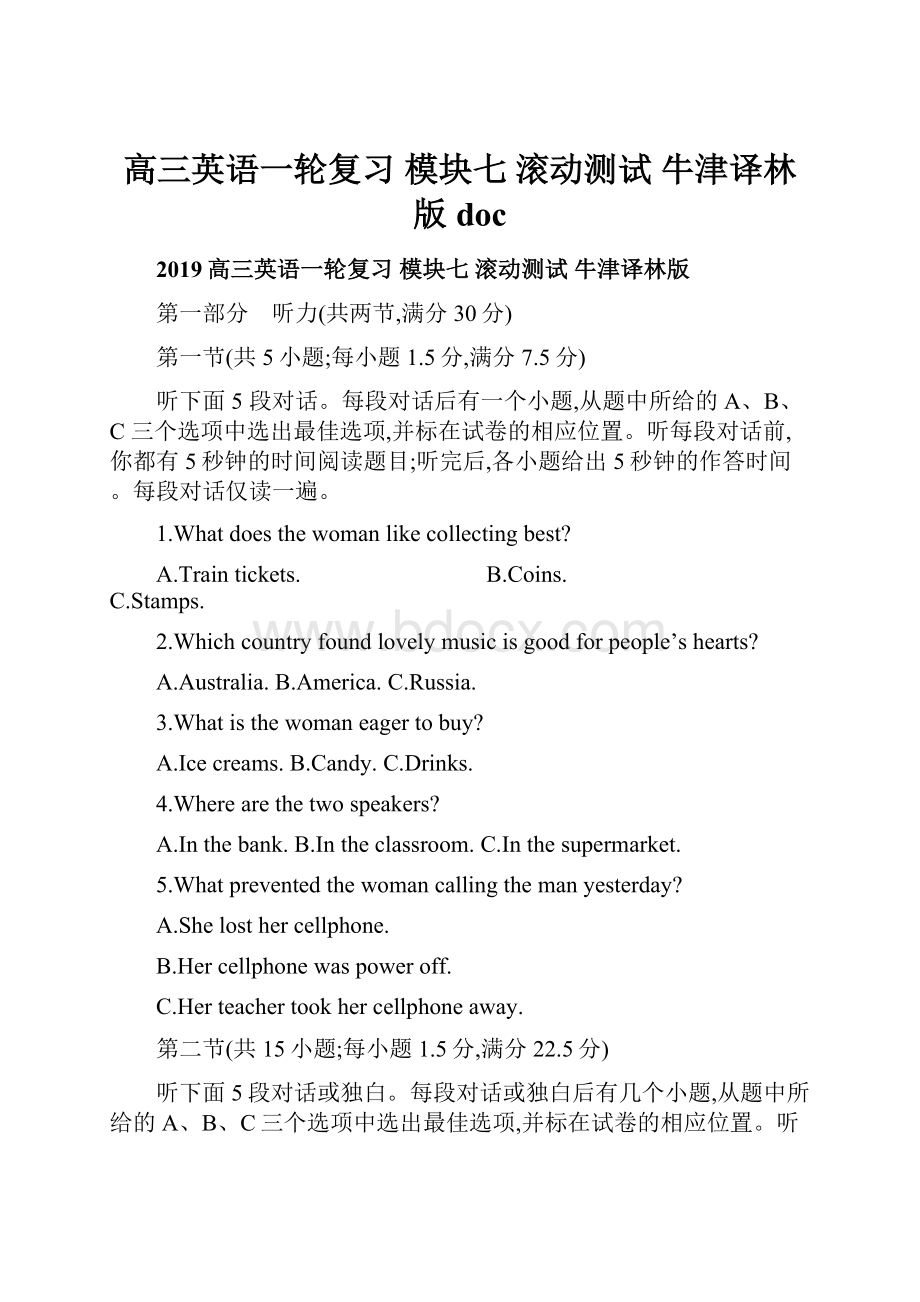高三英语一轮复习 模块七 滚动测试 牛津译林版doc.docx
《高三英语一轮复习 模块七 滚动测试 牛津译林版doc.docx》由会员分享,可在线阅读,更多相关《高三英语一轮复习 模块七 滚动测试 牛津译林版doc.docx(25页珍藏版)》请在冰豆网上搜索。

高三英语一轮复习模块七滚动测试牛津译林版doc
2019高三英语一轮复习模块七滚动测试牛津译林版
第一部分 听力(共两节,满分30分)
第一节(共5小题;每小题1.5分,满分7.5分)
听下面5段对话。
每段对话后有一个小题,从题中所给的A、B、C三个选项中选出最佳选项,并标在试卷的相应位置。
听每段对话前,你都有5秒钟的时间阅读题目;听完后,各小题给出5秒钟的作答时间。
每段对话仅读一遍。
1.Whatdoesthewomanlikecollectingbest?
A.Traintickets. B.Coins. C.Stamps.
2.Whichcountryfoundlovelymusicisgoodforpeople’shearts?
A.Australia.B.America.C.Russia.
3.Whatisthewomaneagertobuy?
A.Icecreams.B.Candy.C.Drinks.
4.Wherearethetwospeakers?
A.Inthebank.B.Intheclassroom.C.Inthesupermarket.
5.Whatpreventedthewomancallingthemanyesterday?
A.Shelosthercellphone.
B.Hercellphonewaspoweroff.
C.Herteachertookhercellphoneaway.
第二节(共15小题;每小题1.5分,满分22.5分)
听下面5段对话或独白。
每段对话或独白后有几个小题,从题中所给的A、B、C三个选项中选出最佳选项,并标在试卷的相应位置。
听每段对话或独白前,你将有时间阅读各个小题,每小题5秒钟;听完后,各小题将给出5秒钟的作答时间。
每段对话或独白读两遍。
听第6段材料,回答第6、7题。
6.Whatisthewomanlookingfor?
A.Acasualdress.B.Aneveningdress.C.Abusinesssuit.
7.Whatwillthewomandonext?
A.Tryontheclothes.
B.Bargainwiththeman.
C.Payfortheclothesincash.
听第7段材料,回答第8、9题。
8.Howoldisthewoman’sgrandfather?
A.79.B.78.C.80.
9.Whatdidthewoman’sgrandfatherdolastwinter?
A.Hewentinthehospital.
B.Hewentonacyclingholiday.
C.Heattendedaskiingcontest.
听第8段材料,回答第10至12题。
10.Whatarethespeakersarguingabout?
A.Whichwaytogo.B.Whotoblame.C.Whattransporttotake.
11.Whydidthepolicemanstopthespeakers?
A.Theytookthewrongshortcut.
B.Theydrovebeyondthespeedlimit.
C.Theywentthroughtheredlight.
12.Whatwastheinitialreasonforwhathappenedtothespeakers?
A.Thewomandidn’tprefertotravelbytrain.
B.Themanfailedtoasktheway.
C.Themanforgottobookticketsearlier.
听第9段材料,回答第13至16题。
13.WhatisthebasicpurposeoftheIQtests?
A.Totestwhoisbrighter.
B.Totesttheabilityinlanguageandnumbers.
C.Tojudgeone’stalents.
14.Whatmakessomanyunhappyparentsintheworld?
A.Theirchildrenbeingstupid.
B.Theirchildren’sfailingintheexams.
C.Theirchildren’sabilitiesnotbeingdeveloped.
15.Whydosomechildrendobadlyinschoolexams?
A.Theyarepoorinwordsandnumbers.
B.Theydonotstudyhardenough.
C.Theyarelookeddownuponbyothers.
16.Howcanapersonbehappy?
A.Puttinghis/herskillstogooduse.
B.HavingahigherIQ.
C.Doingwellintheexams.
听第10段材料,回答第17至20题。
17.Whatistheconductorlike?
A.Anxious.B.Kind-hearted.C.Absent-minded.
18.WhatshouldMr.MoradoinPrinceton?
A.Givealecture.B.Meetanoldfriend.C.Visitauniversity.
19.WhymustMr.Morafindtheticket?
A.Hemightbefined.
B.Heforgotthedestination.
C.Hewrotesomethingimportantonit.
20.WhatkindofpersonisMr.Mora?
A.Forgetful.B.Careful.C.Bad-tempered.
第二部分 阅读理解(共两节,满分40分)
第一节(共15小题;每小题2分,满分30分)
阅读下列短文,从每题所给的A、B、C和D四个选项中,选出最佳选项。
A
NewYork—Atruckstrucka56-year-oldwomanridingaCitiBikethroughMidtownThursdaymorning,andofficersDimitriCoutsouvelisandThomasDemerycametoherrescue,officialssaid.
Twocounter-terrorismpolicemenonSixthAve.nearW.47thSt.spottedthewhitetruckdraggingtheCitiBikeabout9:
30a.m.—momentsafteritstruckthewoman,whowasfoundlyingonthestreetwithaninjuredrightleg,frightenedwitnessessaid.
“Shewasjustlyingthereinalotofpain,”saidStanfordDawson,57,whosellsgoodsonthecornerofSixthAve.and48thSt.“Youcouldseeherlegwasturnedbackandthekneeboneswerestickingoutthroughtheskin.”
Oneofthepolicemenranafterthetruckandforcedittostopwhiletheothertendedtothewoman.
“Thedriveractedalittleconfusedaboutwhathappened,”saidPoliceOfficerThomasDemery,whorantostopthetruckafterhearingthe“soundofthebikebeingdragged.”
“Thewomansufferedadeepgashonherlegfromherkneetoherhip,”saidthepoliceman.“Ikepttellinghernottolookatit,thatit’sgoingtobefine.Ikeptcomfortingher.”
TheambulancerushedhertoBellevueHospitalinstablecondition.Thedriverofthetruckremainedatthescene,policemensaid.Nochargeswereimmediatelyfiled.
“Ican’ttellyouhowproudIamoftheworkthattheCriticalResponseTeamdoeseachandeverydayprotectingNewYorkCity.Generally,peoplethinktheyalwaysfacedangeralldayandsometimestheyshallfeelboredinthestreet,”saidCounter-terrorismChiefJamesWaters.“Theyalwaysperformadmirably,includingtoday.”
“ItfeelsreallygoodtobeapartofhelpingfellowNewYorkers.That’swhatweguyswanttoexpressmost,”Demerysaid.
Carshavestruckandkilledmanybicyclistssofarthisyear,andthereportednumberofdeathsisa21%increasecomparedtothe13killedduringthesametimelastyear.
21.Whichisrightaboutthetruckdriver?
A.Hisover-speedingmadetheaccidenthappen.
B.Hekeptdriving,notknowingtheaccident.
C.Hewasarrestedshortlyaftertheaccident.
D.Hehadhisleghurtintheaccident.
22.Whorantotakecareoftheinjuredwoman?
A.ThomasDemery.B.JamesWaters.
C.StanfordDawson.D.DimitriCoutsouvelis.
23.Whatdothepolicementhinkoftheirworkonthestreet?
A.Rewarding.B.Boring.C.Acceptable.D.Dangerous.
24.Whatcanbeinferredaboutthewoman?
A.Shewasstruckbyatruck.B.Shewasbadlyinjuredinthefoot.
C.Shewasluckytogettimelyhelp.D.Shewasunconsciousinhospital.
B
Untilrelativelyrecently,thevastmajorityofhumanbeingslivedanddiedwithouteverseeingacity.Thefirstcitywasprobablyfoundednomorethan5,500yearsago.Buteven200yearsago,onlyafewpeoplecouldliveincities.Infact,nearlyeveryonelivedonfarmsorintinyruralvillages.Itwasnotuntilthe20thcenturythatGreatBritainbecamethefirsturbansocietyinhistory—asocietyinwhichthemajorityofpeopleliveincitiesanddonotfarmforaliving.
Britainwasonlythebeginning.Soonmanyotherindustrialnationsbecameurbansocieties.Theprocessofurbanization—themigrationofpeoplefromthecountrysidetothecitywastheresultofmodernization,whichhasrapidlytransformedhowpeopleliveandwheretheylive.
In1900,fewerthan40%ofAmericanslivedinurbanareas.Today,over82%ofAmericansliveincities.Onlyabout2%liveonfarms.Therestliveinsmalltowns.
Largocitieswereimpossibleuntilagriculturebecameindustrialized.Eveninadvancedagriculturalsocieties.Ittookaboutninety-fivepeopleonfarmstofeedfivepeopleincities.Thatkeptcitiesverysmall.Untilmoderntimes,thoselivingincitiesweremainlytherulingelite(精英)andtheservants,laborersandprofessionalswhoservedthem.Citiessurvivedbytaxingfarmersandwerelimitedinsizebytheamountofsurplus(多余的)foodthattheruralpopulationproducedandbytheabilitytomovethissurplusfromfarmtocity.
Overthepasttwocenturies,theIndustrialRevolutionhasbrokenthisbalancebetweenthecityandthecountry.Modernizationdrewpeopletothecitiesandmadefarmersmoreproductive.Today,insteadofneedingninety-fivefarmerstofeedfivecitypeople,oneAmericanfarmerisabletofeedmorethanahundrednon-farmers.
25.Whichcountryisthebeginningofurbansociety?
A.China.B.America.C.Britain.D.India.
26.Howdoesthewriterreflecttheexpansionofurbanizationinthethirdparagraph?
A.Byexamples.B.Byproverbs.C.Bycomparisons.D.Bystatistics.
27.Today,whycanthecitybeparticularlylarge?
A.Non-farmershavebecomeless.
B.Agriculturebecameindustrialized.
C.Foodthattheruralpopulationproducedisbecominglessandless.
D.Peopleprefertoliveinthecity.
C
Imaginethisscene:
it’sblowingoutside,andyousnuggle(蜷伏)uponthesofaunderawarmquilt,chattingandrecallingwithyourclosestfriends.
Thatcontent,cosyfeelinghasanameinDanish—hygge.And,asDenmarkrecentlywonthetitleof“thehappiestcountryintheworld”,theconceptofhyggeisknowntomoreandmorepeopleinterestedinfindingwaystounderstandthisconcept.
Hygge—originallyfromaNorwegianwordmeaningwell-being—doesn’thaveanexactequivalent(等同物)inEnglish.It’softentranslatedascoziness,orasbloggerAnnaWesttoldtheBBC,“cozinessofthesoul”.But,asprofessorMarenSparkexplains,“Hyggewasnevermeanttobetranslated.Itwasmeanttobefelt.”
Basically,hyggeinvolvescreatingawarm,cosyatmosphereandenjoyingitwithyourlovedones.Danishwintersarelonganddarkandsoachievinghyggeisparticularlyrelevantduringthisseason.Atypicalhyggeactivityduringwintercouldbeenjoyingdelicioushomemadefoodandlight-heartedconversationwithfriends—preferablyinthewarmglowofcandlelight,ormaybesippingaglassofwineinthehottubafteradayspentskiing.
However,hyggeisn’tonlylimitedtothecoldwintermonths—itcanalsodescribethatwarm,fuzzyfeelingyougetafterawalkthroughaforestwithfriendsonsummer’sdayorafamilybarbecueinthepark.Hyggeismeanttobeshared.
28.Theauthorasksthereaderstoimaginethesceneinthefirstparagraphto .
A.helpthereaderstocalmdownB.introducethetopicofthepassage
C.presentthemainideaofthepassageD.remindthereadersoftheirpastmemories
29.WhatdotheunderlinedwordsbyMarenSparkmean?
A.Thetranslationoftheword“hygge”isnotgoodenough.
B.OnlyDanishspeakersknowwhat“hygge”means.
C.“Hygge”iseasytotranslatebuthardtofeel.
D.Wecangetthetruemeaningof“hygge”byfeelingit.
30.Whichofthefollowingcanbebestdescribedasa“hygge”activity?
A.Skiinginthecoldwintermonths.B.Livingthroughlongdarkwinters.
C.Takingafternoonteawithfriends.D.Walkingaloneintheforest.
31.Theauthorwritesthispassageto .
A.explainB.persuadeC.commentD.advertise
D
Theysaytheaveragepersonmakes35,000decisionsaday.Yetinhernewbook,HowWomenDeci